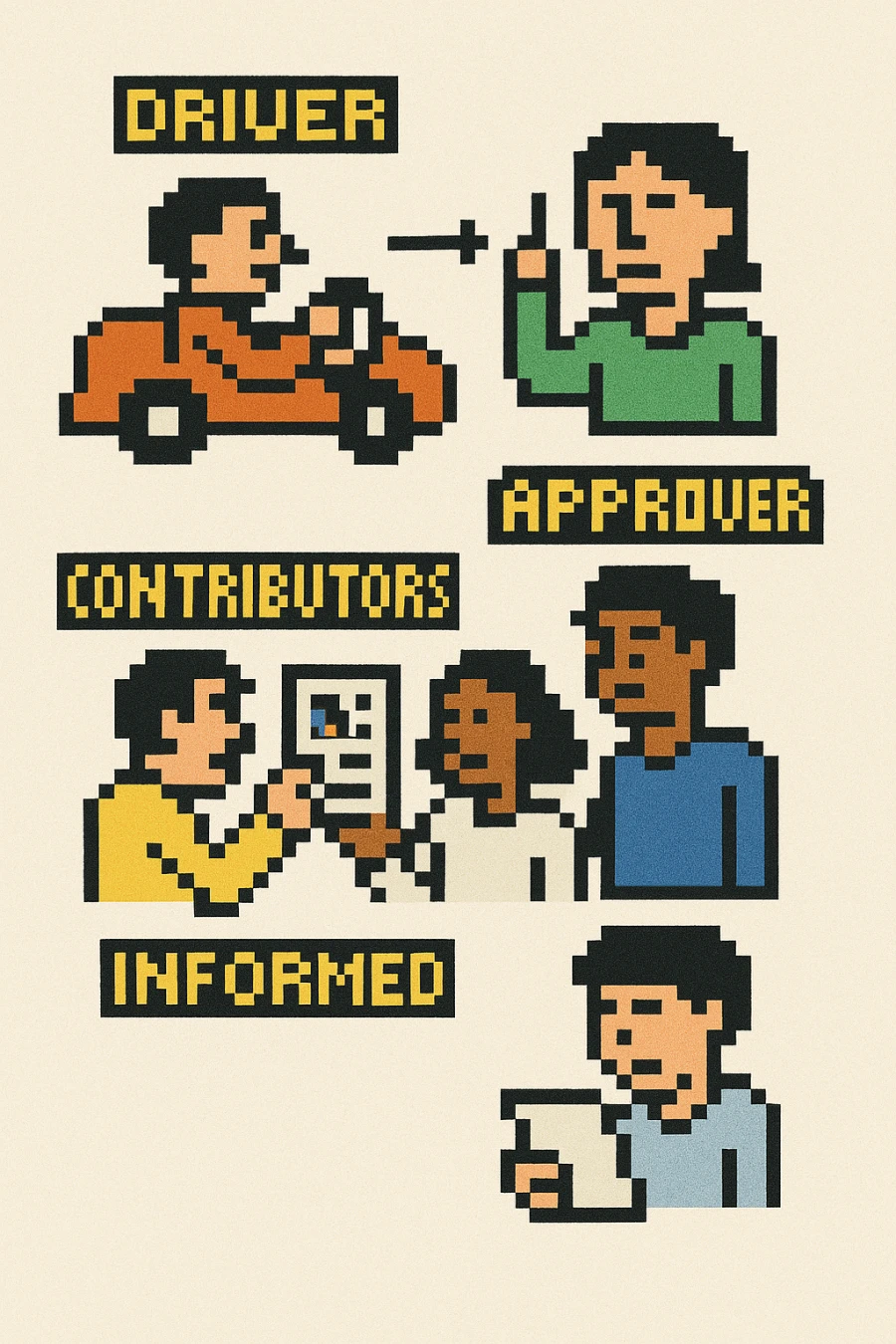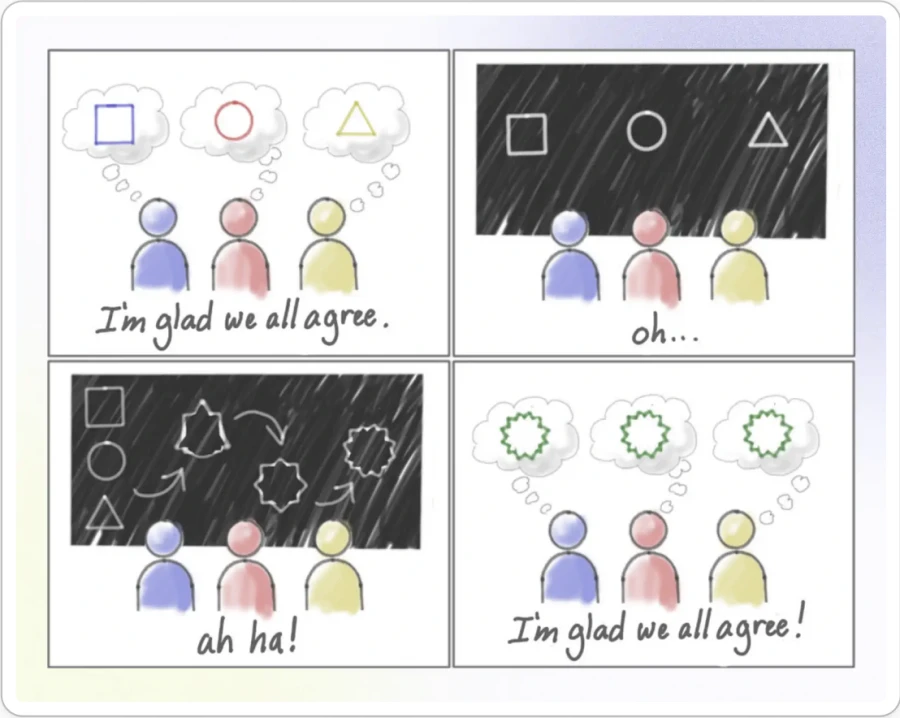I'm a father of three from Sydney, a Product Director and a Product Coach. I write about product management and run the Product Manager community.
Subscribe to receive digest emails (1 per month).
Info
Posts with Communication tag.
-
The best way to get alignment is for someone to own the call, make the decision, and move everyone forward. It doesn't come from talking things through forever.
Long discussions feel safe. They even feel (mistakenly) like progress. But they slow everything down.
Like a slow-mo scene from The Matrix.
I hate it.
Clear decisions are risky and a bit scary. But they give your team the direction it needs.
Do this If you want faster and cleaner decisions:- End every meeting with one line: “Here's what we're doing.”
- Give every decision a single owner. No committees.
- Set a deadline to review the outcome, not to keep debating.
-
Have you heard of the DACI model? It might sound like something from a government department, but it's actually a decision-making framework.
It's easy to use and helps prevent confusion about roles and responsibilities within a team working on a product or project.
Driver
This person owns the decision, pushes it forward, and chases people with gentle nudges, like the classic “Just bringing this back to the top of your inbox” email.
Approver
The one with the final say, who signs off, breaks ties and takes responsibility for the outcome.
Contributors
The people who provide ideas and context. Keep this group small - it's not a group vote.
Informed
Those kept in the loop once a decision is made. They're often the ones asking later, “Wait, when did we decide that?”

-
Async creates space for sharper thinking.
So before booking your next meeting, try writing instead. Start with a proposal. Add context. Share trade-offs. Then pause. Let people digest, reflect and reply in their own time. The best ideas often come from the second draft, not the first reaction. -
Verbal yeses mean nothing.
People hide behind them because there's no receipt. No audit trail. No follow-up. Just vibes. Verbal commitments are slippery by design - they give the illusion of agreement without the weight of action. They make it easy to nod, avoid conflict, and walk away uncommitted.
Written words change the game. They lock the conversation in place. A two-line follow-up after a chat becomes a timestamp. A shared truth. A trigger for action. Because once it's written, it's real. There's a name. A date. A decision. Suddenly, that “yes” carries weight. Accountability kicks in.
That's why some avoid writing things down. It removes the wiggle room. It kills plausible deniability. But if you're serious about progress - write it. Even if it's rough. Especially if it's uncomfortable. Written words drive the work. -
How to get better answers from your peers.
Instead of asking your peers to weigh in on different options and the best solution, just give them a solution. Stake a claim. Make it visible. Then let them shoot holes in it.
Framing it as “Here's my current thinking, based on the information I have today” does two things. It keeps you from sounding arrogant. And it opens the door for others to improve it. Feedback gets sharper. Responses come faster. The conversation shifts from “What should we do?” to “What's wrong with this?”
That's how you get to better answers...faster.
P.S. Not for every situation - just the ones where speed matters and your peers already trust you. -
The point isn't to get it right. It's to get it moving. You shape, share, and sharpen through feedback. That's how the rough idea turns into something worth showing.
Start with a mess. End with a star.

What's shaping? See shaping the work. -
Feedback lands best when the walls are down.
But too often, it does the opposite. It raises shields. Because even when intentions are good, the words feel sharp. The tone feels off. And the brain - wired for survival, not nuance - reads threat where you meant support.
It doesn't matter how thoughtful or constructive the feedback is. If the other person is in defence mode, they won't hear a word of it. They'll hear judgment. They'll hear risk. They'll hear “you're not good enough.” That's why intention isn't enough. Clarity is what cuts through.
So be clear.
Not in a vague, corporate tone. In plain language. “You're doing well. I want to help you do even better.” Or, “This is something I wish someone told me earlier in my career - I think it might help.” You're not correcting.
Feedback delivered too late becomes irrelevant or awkward. Deliver it while the moment's fresh and the actions are remembered. But always with context. Always with care.
Because the goal of feedback isn't to win an argument. It's to build someone up without them feeling torn down.
If you're trying to improve how feedback lands, a product management coach can help you practise framing it in a way that actually builds trust.
Frame it right, and feedback becomes a shield. Not a weapon.

-
Success comes from repeating the right words, not just saying them once.

-
Misalignment is one of the most common (and costly) issues in product development, project planning and team collaboration. Whether it's about the problem you're solving, the solution you're building or simply the language you're using, assumptions often go unnoticed until it's too late.

Who This Is For
- Product Managers, Product Designers, engineers and team leads who are struggling with unclear priorities or conflicting understandings.
- Anyone working in cross-functional teams who wants to reduce rework, missed expectations and confusion.
Common Questions This Addresses
- “Why does everyone think we agreed, but we all had different ideas?”
- “How can I surface misalignment before it causes delays?”
- “What's the fastest way to get everyone on the same page?”
Why Writing Down Your Thinking Matters
1. Surface Hidden Assumptions
People often agree verbally, but are visualising completely different things. Putting ideas into writing reveals these mismatches early.
2. Create Shared Understanding
Writing clarifies your own thinking and gives others something concrete to react to, challenge, and align with.
3. Enable Asynchronous Collaboration
Not everyone is in the same room or timezone. A written artefact (like a user story map or brief) allows everyone to engage in their own time.
4. Reduce Future Friction
What feels like a tiny misunderstanding today can snowball into big problems later. Written alignment now prevents costly rework down the line.
Practical Tip: Use User Story Mapping
User story mapping is a collaborative visual exercise that helps teams define the user journey and prioritise features. More than just a diagram, it's a tool to:- Capture what users are trying to achieve
- Break down features into meaningful slices
- Highlight disagreements early
How to Start
- Write it down. Even a rough sketch or bullet list is better than nothing.
- Invite collaboration. Ask others to review, question, and contribute.
- Don't assume agreement. Check for true understanding, not just nodding heads.
If no one has written it down yet, that's your cue. Misalignment loves ambiguity. Writing brings clarity and saves time, money, and trust later.
Document early. Share often. Align before you act. -
Recently I wrote about the most important skill for Product Managers.
Regardless of whether you are a Product Manager or not, the communication will help you with all aspects of your career. If you want to manage or be a leader, you have to be a good communicator. Specifically, you need to get better at framing.
What's your goal? Are you looking for feedback, sharing information, wanting to influence, asking for approval or something else entirely?
What are you sharing? Is it a problem? Maybe a solution? A vision? Or a mix?
How much detail are you planning to share? Is this a helicopter or detailed view? Or perhapse, both?
Who's your audience? Your team, the entire organisation or the executive group?
Your communication needs to be adjusted depending on the answers.
Early in your career, you use the same message no matter the context.
To grow, you need to get better at tailoring your message - what you say, how you say it and when to say it. -
Don't leave your meeting description blank - it's a pain for everyone! Respect your team's time.
1. Start with the purpose - explain why the meeting exists and what the team needs to do.
2. If you're using FigJam, Zoom or anything else include it upfront so no one's scrambling.
3. Share pre-reading and start your meeting with 5–10 minutes of reading time.
4. Is this for brainstorming, updates or decision-making? Let everyone know what to expect.
5. If someone can't attend, let them know they can share their feedback later. -
Trust grows when care takes the form of action.
Teams don't excel in comfort; they grow through accountability. A challenge, a nudge or a push is a signal of shared commitment. Speaking up shows someone values the team enough to stay invested and engaged.
Without trust, feedback sounds like conflict. With trust, it becomes progress. -
Our behaviours shape how others perceive us.
Some things we do, we want that to be part of who we are.
Some other actions remain hidden to us until someone tells us about them.
If you notice something inappropriate, a direct and genuine conversation is the best approach.
Try the Situation-Behaviour-Impact framework. It makes these conversations easier and less awkward. -
Asking for help drives progress.
The strongest teams thrive on trust, communication and self-awareness. Silence in struggle delays outcomes and keeps answers out of reach.
Great leaders create environments where asking for help feels safe. Confident individuals know when to lead, when to listen and when to ask. -
Clarity is a PM's superpower. Early in a career, speed feels like the ultimate skill. Later, strategy seems like the key. Over time, it becomes clear - strong communication makes the difference.
Brilliant strategies crumble without understanding. Clear communication creates alignment. Alignment builds trust. A team that trusts your judgement will follow your lead, and leadership confident in your clarity will give you room to excel.
Great PMs don't just build products. They build trust by making the complex simple and the ambiguous clear. -
Broken Isn’t Always Yours
If you've ever felt like something's off in your team...a process dragging, communication breaking down or decisions getting delayed but didn't say anything because “it's not your job to fix it,” you'... Read more -
SCQA Framework: Examples and How to Use It
The SCQA (Situation, Complication, Question, and Answer) framework, also known as the Minto Pyramid Principle, is a communication and problem-solving tool that breaks down complex ideas into simpler,... Read more -
Building Trust with a Founder
First of all, make sure that you understand the founder's context, the things the founder cares about and worries about, and the overall vision.
One of the most important things is to get to the bott... Read more
Feel free to reach out: [email protected].
